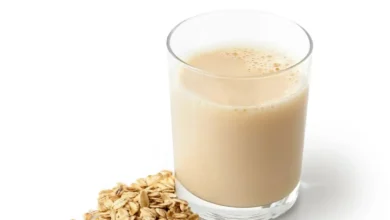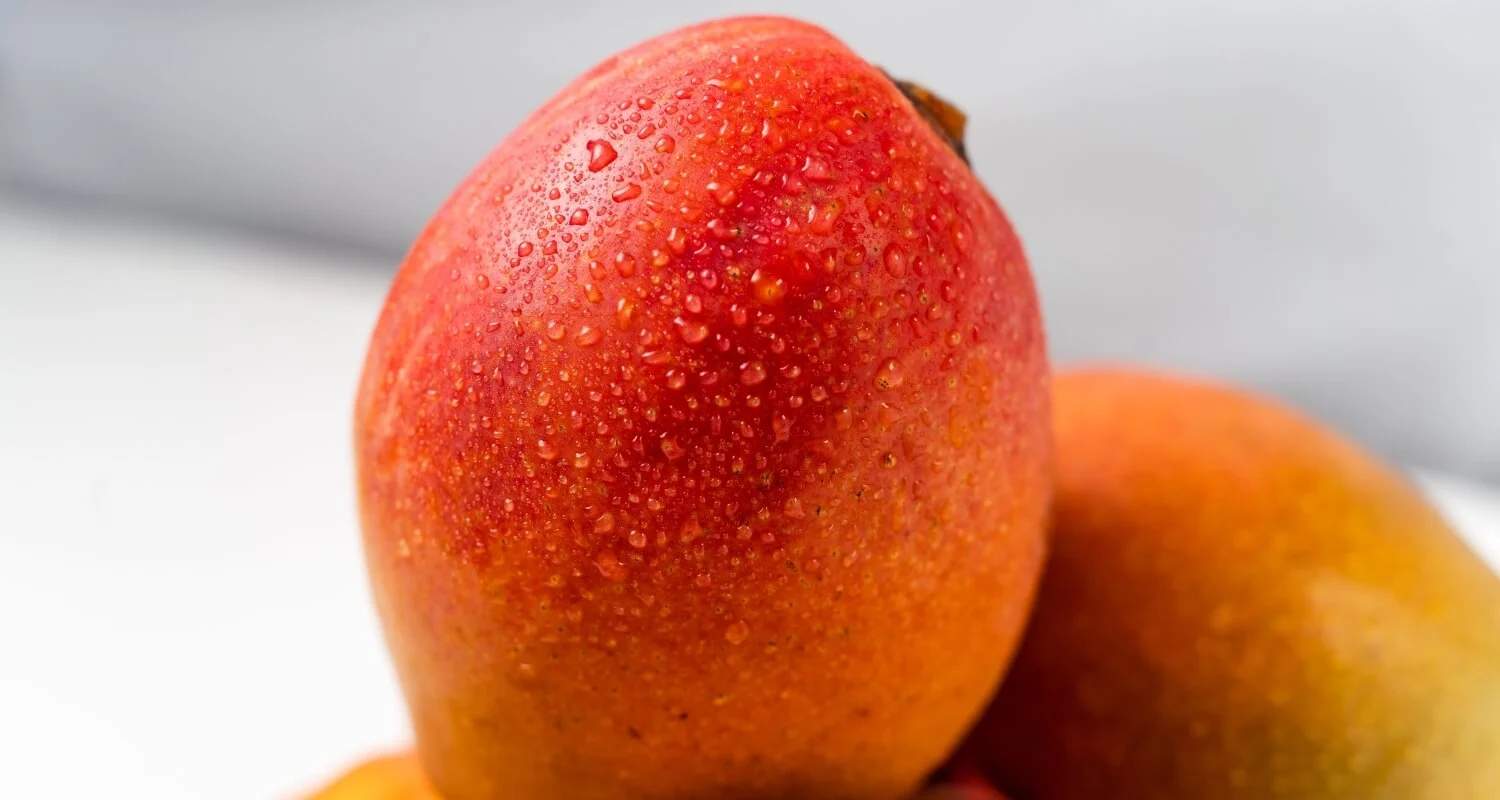
Mangoes are synonymous with tropical bliss, conjuring images of sunny days and exotic destinations. But beyond their sweet, succulent taste and vibrant colors, mangoes are nutrient powerhouses loaded with vitamins, minerals, and antioxidants. In this comprehensive guide, we’ll explore the myriad of ways in which this delightful fruit can contribute to your overall health and well-being. Whether you’ve been eyeing that ripe mango at your local grocery store or simply curious about incorporating it into your diet, read on to discover the health benefits and tempting recipes that make mangoes a must-have addition to your menu.
Nutritional Value of Mangoes
Before we explore the health benefits, it’s important to understand the nutritional profile of mangoes. This tropical fruit is rich in essential vitamins and minerals, making it a valuable addition to any diet.
Vitamins and Minerals in Mangoes
Mangoes are an excellent source of:
- Vitamin A: Vital for vision, immune function, and reproductive health.
- Vitamin C: An antioxidant that supports the immune system and helps with collagen production.
- Vitamin E: Another powerful antioxidant that protects your cells from damage.
- Potassium: A mineral crucial for heart health and muscle function.
- Vitamin K: Important for blood clotting and bone health.
- B Vitamins: Including niacin, folate, thiamine, and pyridoxine, which play various roles in the body, such as energy production and red blood cell formation.
The list doesn’t end there; mangoes also contain small amounts of calcium, magnesium, and phosphorus, essential for bone health, and trace amounts of iron, which aids in oxygen transport in the blood.
Antioxidants in Mangoes
Antioxidants are compounds that help protect the body from harmful molecules called free radicals, which can contribute to various diseases.
Mangoes are rich in several plant compounds with antioxidant properties, such as:
- Polyphenols: Found in the fruit, peel, and leaves.
- Carotenoids: Including the prominent beta-carotene, which gives mangoes their vibrant color.
- Ascorbic acid: Also known as vitamin C, a potent antioxidant that’s especially beneficial for immune health.
Mango Health Benefits
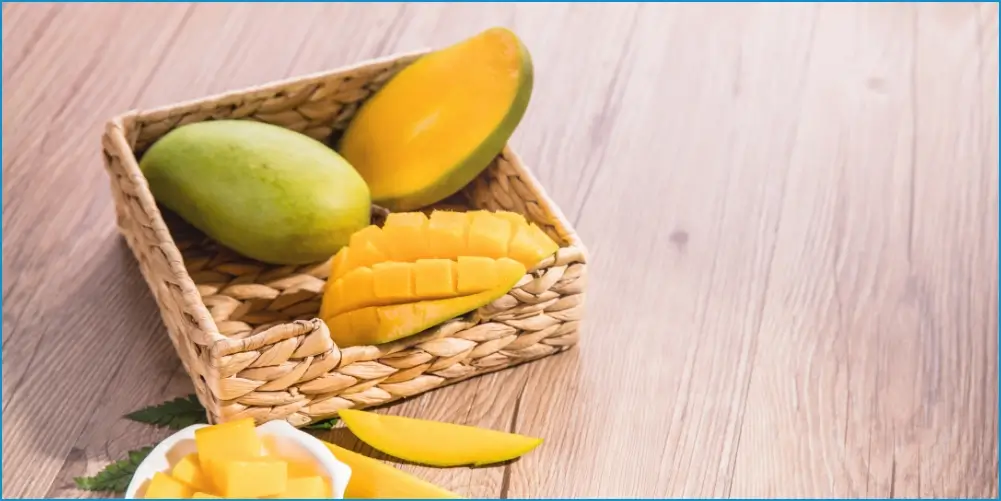
With its impressive nutrient content, it’s no wonder that mangoes offer a range of health benefits.
Digestive Health
Mangoes are a rich source of dietary fiber, with just one cup providing around 12% of your daily requirement. Fiber is essential for a healthy digestive system, as it adds bulk to your stool and helps prevent constipation. Additionally, mangoes contain enzymes like amylases, which aid in the breakdown of complex carbohydrates, making digestion easier on the stomach.
Immune System Support
The vitamin C content in mangoes is a boon for your immune system. As an antioxidant, vitamin C helps protect cells against damage from free radicals and is crucial for the production of white blood cells, which are your body’s defense team against infections. The high vitamin A levels found in mangoes also play a role in immune function, particularly in maintaining the health of mucosal surfaces, such as the lining of the gut and respiratory tract.
Skin and Hair Benefits
Mangoes are great for your skin and hair, with benefits ranging from reducing signs of aging to promoting hair growth. The vitamin A and beta-carotene in mangoes are incredibly skin-friendly, while the vitamin C supports the building of collagen, which gives skin its structure and promotes elasticity. Applying mango pulp or juice topically can give your skin a radiant glow.
Mango Recipe Ideas
Now that we’ve covered the health benefits, it’s time to get creative with mangoes in the kitchen. Here are some delicious and healthy recipe ideas to help you enjoy this tropical fruit in various ways.
Mango Smoothies
Mangoes make for a luscious addition to smoothies, adding natural sweetness and a creamy texture. Try blending mangoes with other fruits like bananas and berries, a splash of coconut milk for richness, and a handful of spinach for an added nutrient boost.
For an indulgent treat, create a mango lassi by blending mango with yogurt, a touch of honey, and a sprinkle of cardamom. This Indian-inspired drink is not only delicious but also a great way to incorporate probiotics from the yogurt, supporting your digestive health.
Mango Salads
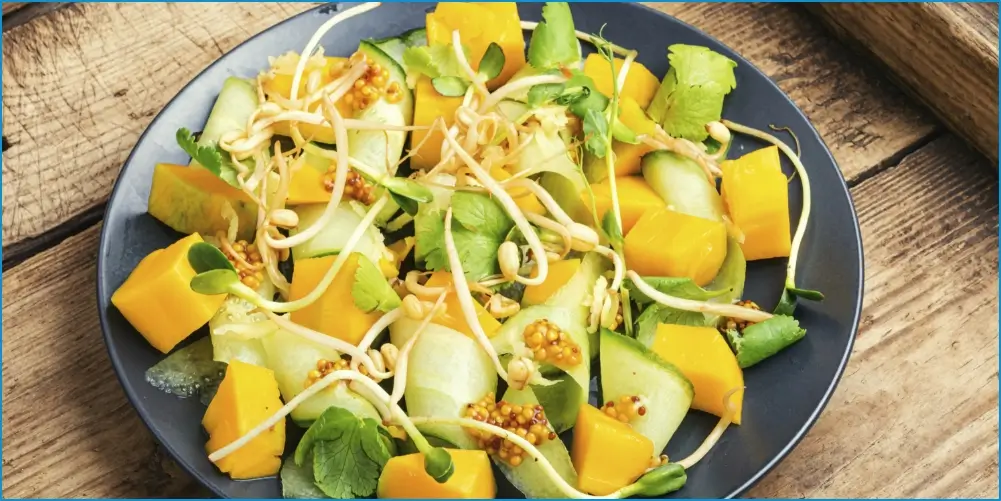
Mangoes can bring a burst of flavor to your salads. Combine diced mango with cucumber and red onion for a refreshing side dish. Drizzle with lime juice and season with a pinch of chili powder and a sprinkle of cilantro for a Mexican-inspired twist.
For a more substantial salad, mix diced mango with cooked quinoa, black beans, avocado, and a zesty lime vinaigrette. This salad is a perfect combination of sweet, savory, and spicy flavors, with the added protein and fiber from the quinoa and beans.
Mango Desserts
Mangoes can star in a variety of desserts, from simple mango sorbets to complex mango cheesecakes. One popular and easy-to-make mango dessert is a sorbet made with pureed mango, a sweetener of your choice, and a little lemon or lime juice to balance the sweetness. Freeze the mixture until firm, then blend for a creamy, cool treat.
For a more decadent option, try a no-bake mango cheesecake, where a creamy, mango-flavored filling is set on a base of crushed biscuits. It’s a delightful dessert that showcases mango at its sweet and creamy best.
Link to Healthy Smoothie Recipes
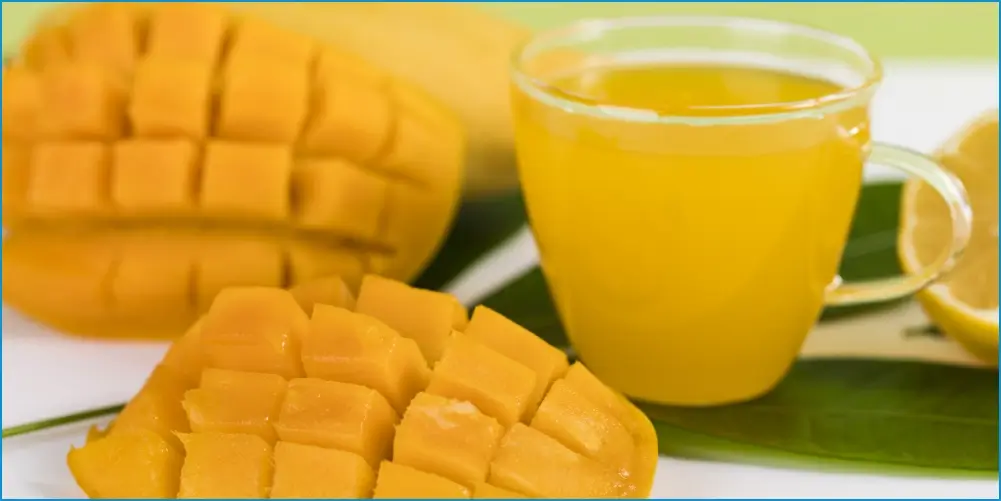
To complement your newfound love for mango smoothies, consider our collection of healthy smoothie recipes. As a perfect morning energizer or a post-workout refuel, these recipes offer a blend of flavors and nutrients that align with your health goals.
Conclusion
Mangoes are not only delicious but also incredibly nutritious. They offer an array of vitamins, minerals, and antioxidants that can benefit your health in numerous ways. Whether you enjoy them in a salad, a smoothie, or a dessert, making mangoes a regular part of your diet allows you to relish their sweet, tropical taste while reaping the health rewards they offer.
If you’re looking to step up your health game, don’t hesitate to introduce mangoes into your meal planning. Their versatility and health benefits make them a welcome addition to any diet—and an especially delightful one at that.
Frequently Asked Questions about Mangoes
What is the best season to buy mangoes?
The best season to buy mangoes varies depending on the variety and the region they are grown in, but generally, mangoes are in peak season during the warmer months from May to September.
Can eating mangoes help with weight loss?
Mangoes can be a part of a healthy weight-loss diet when consumed in moderation. They are nutrient-dense and contain fiber, which can help you feel full longer. However, they are also relatively high in sugars, so portion control is key.
Are mangoes good for diabetics?
Diabetics should consume mangoes in moderation due to their sugar content. It’s best to consult with a healthcare provider for personalized advice, but generally, including mangoes as part of a balanced diet with other low glycemic index foods can be appropriate for some diabetics.
How do you store mangoes?
Unripe mangoes can be left at room temperature to ripen, which usually takes a few days. Once ripe, they can be stored in the refrigerator to slow down the ripening process and extend their shelf life. Cut mangoes should be stored in an airtight container in the refrigerator and consumed within a few days.
Can you freeze mangoes?
Yes, mangoes freeze well. Peel and cut the mango into slices or chunks, spread them on a baking sheet to freeze individually, and then transfer to a freezer-safe bag or container. Frozen mangoes are great for smoothies or as a cold snack.
How can you tell if a mango is ripe?
A ripe mango will give slightly to gentle pressure and will often have a sweet aroma near the stem. The skin color is not always an indicator of ripeness, as some varieties remain green even when ripe.
Are there any side effects to eating mangoes?
Mangoes are safe for most people when eaten in reasonable amounts. However, those with latex allergies may react to certain compounds in mangoes, and some individuals might experience digestive upset if they consume too many mangoes due to their high fiber content.
